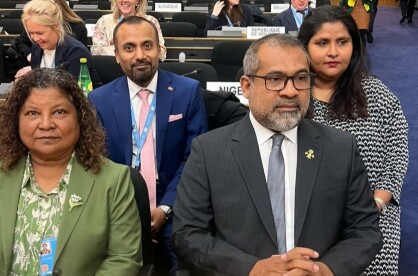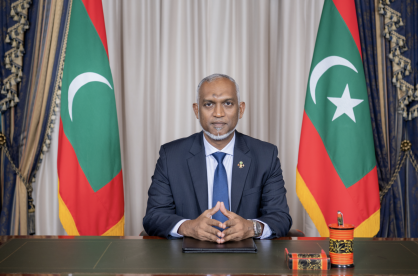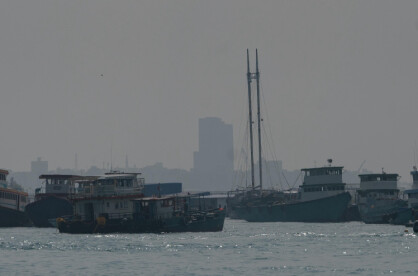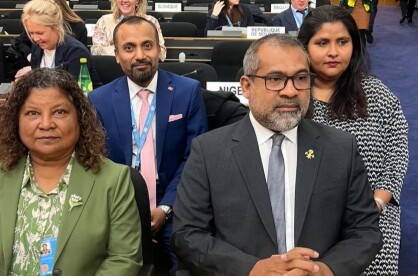Democracy has been quite an elusive dream, introduced, as reinforced upon us in recent times, to the Maldivian people in the 2000s by Mohamed Nasheed. Charismatic, driven, and supposedly not beholden by the classist disciplines of the national leaders before him, he rekindled the Maldivian spirit for change, promised them a nation free of corruption, where there are no elites and no paupers.
Some promises age gracefully. Others, like Nasheed's, linger just on the cusp of reality, always barely unachieved for what feels like all eternity.
The zero tolerance administration of Solih and, some might say quite literally, friends has been quite kind towards a number of individuals that spit in the face of justice. People like former Vice President Ahmed Adheeb have been treated with a kindness unwarranted; kindness that is not spared to the thousand others in incarceration. When the fiasco of the missing ventilators hit tabloids, the principle of zero tolerance took a backseat, leaving the matter unresolved, unsolved, ignored.
It is a cause for public concern when a minister goes through multiple suspensions during his tenure. Or is it? Not in the case of Minister of Youth, Sports and Community Empowerment, Ahmed Mahloof, who had a timely return to his position during the SAFF Championship, prominent on the stands throughout the fanfare and hype. People in the highest leadership positions in the nation now merit the opportunity to openly declare their influence on another pillar of democracy, checks and balances notwithstanding.
Two major motivational points of Mohamed Nasheed’s anti-campaign against the Maumoon regime were the lavish lifestyles, of him and his cronies, supported by public monies, and rampant in nepotism — yet according to the laws of the land at the time, ludicrous as it may be still, for the most part, legal. The people expected humbleness, the people hoped for transparency and equal opportunity. As if on cue, entire bodies of governance and power have been distributed amongst friends and family, with the head of the police force on dining terms with the president. Members of parliament lament the lack of classist and elitist treatment they were promised when they took on party tickets, demanding state-funded VIP treatment for healthcare, familial support, and travel privileges, such as VIP lounge access, diplomatic passports for spouses, and other distinct advantages over the people they vowed to serve.
Beyond this lip service, when it comes to the balance sheet, the very champion of the people, Mohamed Nasheed rakes in the salary of both Speaker of Parliament, and the parliament approved ‘former presidents’ allowance. After the attack on his life, claims of lack of security allows him to stay at multi-star hotels, while having a palace built for him right across the Supreme Court — which one is left to suppose does not affect the security of the courts at all. His travels throughout Europe, along with the President’s arguably unnecessary travels, though the sizes of his entourage are subject to less arguable debate, during a pandemic, rack up bills to be footed by the people’s tax, and fines, money.
To be fair, with the announcement of the recent budget, it seems that civil servants, at the very least, would be getting a piece of the pie, and an elevation in their living standards. Many infrastructure projects are in the works, and the people are surely going to benefit from them, if handled and distributed fairly. Leaving that bridge to cross when the nation gets there, a quiet, albeit ground-shaking policy change has been wrought by those who should know better.
If civil servants aren’t allowed to discuss politics, why is a Speaker of Parliament trying to decide how the Executive branch of government or the Judiciary should be run? Why should such a voice be allowed to carry enough weight in disrupting even bilateral discussions?
This administration has been brilliant at PR, with climate change mitigation hypocrisy in the front pocket while speaking with conviction on global stages as they get mocked to pieces on social media for their openly false virtue. So much has been done superficially, with the constant excuse of ‘previous administration’ to offset any shortcomings in their work. What’s really disheartening is how the people had voted almost overwhelmingly in support of a change, of the manifesto that promised so much for equality and equity, yet have not the sins upon which they’d cast their stones redone, but been amplified beyond historical records. All throughout, maintaining face with aptly written press releases and controlled press conferences, the Solih Administration has been creating a rift not only amongst the people, but amongst the very party that once stood unanimously strong against elitism and classism.
A running joke throughout the ages has been that politicians shouldn’t be trusted, but how such effort has been made to reinforce this stereotype is a little too much. The constant lauding of the democracy promise is getting old and worn out, and at the rate at which the nation is dwindling in terms of politics, the party currently in power may have crippled their support base a little beyond repair.
When certain individuals propose the importance of switching governing systems that suspiciously make it easier for these individuals to comparatively increase their power, the people need to rethink their votes. Accountability is flying out the window, with the likes of former minister Ali Waheed getting to gobble down a healthy slice from every regime’s pie and still not being brought to justice as fast as a wrongfully-accused citizen gets tossed in jail without bail.
Keep in mind, promises can be bought, sold, repackaged and renamed in Maldivian politics. What would be certain in bringing about change would be a refresher on the players dominating the field, younger, actually patriotic people coming together and striving for action in line with their progressive words.
This administration compares closely against the strong-armed Yameen Administration but on the other end of the spectrum, and continues to do so while re-election campaigns are already underway. Without accountability, deliverance on promises, and transparency, the people are only getting cheated out of their votes, and the promise their nation holds.
More from MFR's 'Democracy hijacked' series;







